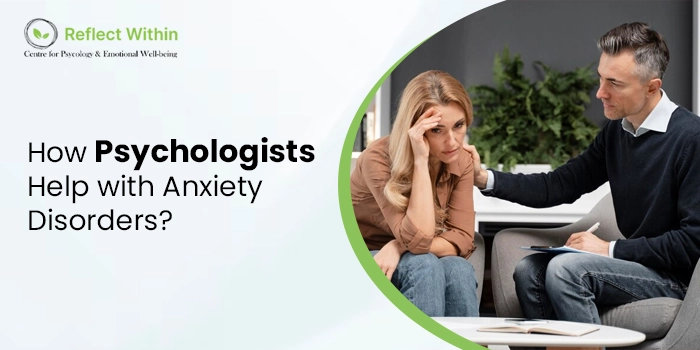How Psychologists Help with Anxiety Disorders?

Anxiety disorder is a problematic condition related to mental health, wherein you may respond to stressful situations with fret, panic, or worry. It can also affect your ability to function in different environments, such as school, work, or social situations. Furthermore, it can disrupt a person’s relationships with friends, colleagues, or family members.
If you are seeking help with anxiety disorder, an experienced psychologist near you can help. They are well-trained professionals who can help in a wide range of the concerns related to the mental health. Let’s understand the role of a psychologist in anxiety disorder treatment.
What Is Anxiety? An Overview
You might feel anxious in stressful situations in life. However, it becomes problematic when the temporary fears or worries become persistent. Anxiety involves a persistent sense of fear, worry, or restlessness. It does not go away easily, and its severity increases with time.
It starts interfering with your day-to-day life, and you may experience difficulty concentrating. There are different forms of anxiety disorders, as listed below:
- Generalized Anxiety Disorder (GAD).
- Panic Disorder.
- Social Anxiety Disorder.
- Phobias.
- Separation Anxiety.
- Social Anxiety Disorder.
Common Anxiety Symptoms
Navigate through the symptoms of anxiety to understand it better:
- Consistent feeling of nervousness or restlessness.
- Always feeling a sense of danger or panic.
- An increased heart rate makes one feel vulnerable.
- Rapid breathing, also referred to as hyperventilation.
- Fatigue, trembling, or sweating.
- Feeling weak or tired and performing tasks half-heartedly.
- Unable to focus Concentrating on a present worry.
- Troubled sleep is also one of the common symptoms of anxiety.
- You feel no control over the stress or worry.
- Fear of situations that can trigger anxiety.
What Makes You Prone To Develop Anxiety Disorder?
There are multi-faceted factors that can make you prone to developing anxiety disorder. Some of the most prominent risk factors may include:
- Childhood Trauma
Someone who has witnessed traumatic events in the past or endured an abusive childhood is more likely to develop anxiety. It can take the form of Post-traumatic Stress Disorder (PTSD), causing panic attacks.
- Mental Health Conditions
- Sexual Abuse
- Stress Build-up
- Personality
- Negative Life Events
- Alcohol or Drug Abuse
- Chronic Health Condition
When To See A Psychologist For Anxiety?
People feel fear or worry occasionally, but sometimes coping with it becomes very difficult. When you feel no control over it and the anxiety starts interfering in your day-to-day life, it is high time to see a psychologist. Some other concerning situations in anxiety are:
- Too much worry or stress prevents you from focusing on other crucial parts of life, such as work, relationships, etc.
- Worry, restlessness, or racing heartbeat you feel no control over.
- Depression and alcohol or drug abuse to numb the negative feelings related to the anxiety.
- Co-occurring mental health conditions along with anxiety.
- Anxiety paired with a physical health condition or ailment.
- Reach out to a psychologist in your vicinity immediately if you are having suicidal thoughts.
How Does A Psychologist Help In Treating Anxiety?
An adept psychologist will diagnose the condition and the associated risk and, thereafter, offer the best therapy based on your condition.
Diagnosis
First of all, when you reach a psychologist, your condition is thoroughly diagnosed. Sometimes, a physical ailment can also give you mental stress and trigger anxiety. Therefore, evaluate your current mental state through a detailed psychological evaluation.
In this session, they discuss your thoughts in order to navigate through your feelings and behavior. It helps them to get insights into your mind and diagnose the risks related to anxiety. Diagnosis of anxiety disorder is difficult when coupled with other mental health conditions or substance abuse
.Treatment
There are different types of psychotherapies used for the treatment of anxiety. Talk therapy is a self-reflective process that helps individuals process, identify, and address the factors that are causing anxiety. Some of the most effective therapies for anxiety are:
1: Cognitive Behavioural Therapy
Cognitive behavioral therapy is one of the most effective psychological treatments for anxiety that has proven to improve functioning and quality of life. It is based on the principle that most psychological problems are caused due to the unhelpful patterns of thinking and behavior learned throughout our lives.
Therefore, a psychologist in talk therapy helps you understand how your distorted thinking is creating problems in life. Also, they help individuals re-evaluate their thinking while keeping the reality in check. Gaining a better insight into your thinking and behavioural patterns, you can develop better problem solving skills and cope up with anxiety.
2: Exposure Therapy
In exposure therapy, your therapist exposes you to the objects or situations you fear the most in a safe environment. The repeated exposure helps individuals feel a better sense of control over the feared situation, thereby keeping the fear of the unknown at bay.
The feared situations that are causing you anxiety can be comforted gradually with the help of exposure therapy. Sometimes, it is used alone, while your psychologist can use it in combination with cognitive-behavioral therapy to treat anxiety.
3: Psychodynamic Therapy
Psychodynamic therapy helps individuals navigates through the past experience in order to find the relation between past and current mind set. This therapy is based on how emotion and psychological forces interact with a person’s mind. It may include childhood trauma or other fretful events.
The role of a psychologist is most important in psychodynamic therapy as the topics to be discussed with them are sensitive and traumatic. The sessions can be carried out for individuals, couples, or families in order to help an individual promote their self-awareness, gain better control, and relieve the symptoms of anxiety.
4: Interpersonal Therapy
Interpersonal therapy helps you get an insight into your thoughts and feelings by working with your psychologist. If you are going through anxiety or a major transitional phase in life, this therapy can be helpful for you. IPT is a short-term therapy for the treatment of various mental health-related conditions, including anxiety.
The therapy is based on improving relationships. Your psychologist maintains an interpersonal inventory that has a detailed review of your relationships, both past and present. Thus, your therapist can determine what is causing you the most challenges. When the problems are known, it is easy to override them.
5: Dialectical Behaviour Therapy
Dialectical Behaviour Therapy is an effective therapy for anxiety disorder. DBT is used for individuals who experience emotions very intensely and face difficulty in managing and regulating their emotions.
Dialectic means something that is comprised of the opposite ideas. Similarly, the therapy based on two opposite ideas – Acceptance and Change. When rendering this therapy, your psychologist helps you accept the reality of your life and change it by eliminating the unhelpful thinking and behavioural patters. It is also known to comfort the signs of anxiety among people.
Takeaway!
We have seen that how a psychologist can play a pivotal role in determining the relieving the anxiety symptoms. However, it is crucial to find the best psychologist in your area. You may ask for the referrals from the people you trust. If you are looking for a psychologist in Mumbai, reach out to Reflect Within to get free consultation.
Latest Post
Categories
Book Session

















